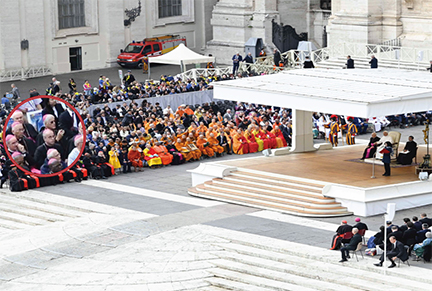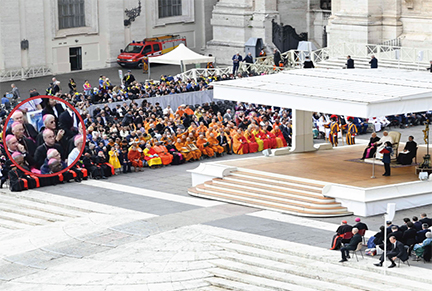“All the ends of the earth shall see the salvation of our God.”
(Isaiah 52:10)
By Bishop Joseph R. Kopacz, D.D.
For nearly two thousand years, the Good News of Jesus Christ’s birth, life, death and resurrection has been proclaimed to all the nations. Now more than ever, through modern channels of communication, the message goes out to the ends of the earth for people to hear this Good News and to see the church in their midst serving their Lord in manifold ways.
The following three excerpts have been chosen from different eras in the church’s history to affirm that while the world may be continually in flux, Jesus Christ is the same yesterday, today and tomorrow.
The following is taken from the profound works of the one who was esteemed as “golden mouth” for his brilliant preaching:
“That invisible and eternal nature has not disdained for our sakes to take to itself the infirmities of our flesh. The Son of God, who is the God of all things, is born a man in body. He permits himself to be placed in a crib, who holds the heavens in his hands. He is confined in a manger whom the world cannot contain; he is heard in the voice of a wailing infant, at whose voice in the hour of his passion the whole earth trembled.” – St. John Chrysostom, Epiphany Homily

This fourth-century saint was exiled three times and suffered immensely at the hands of the Arian heretics of his day. He not only persevered; he thrived as a living witness to the power of the Word made flesh.
In the fifth century, Pope Leo the Great, who resisted Attila the Hun at the gates of Rome, convincing him not to sack the city, was one of the most eloquent Fathers of the early church. The following comes from a Christmas homily of his and adorns the contemporary Christmas prayer of the Catholic Church in the Liturgy of the Hours:
“Today our Savior is born; let us rejoice. Sadness should have no place on the birthday of life. The fear of death is swallowed up; life brings us joy with the promise of eternity. No one is shut out from this joy. Let the just rejoice, for their reward is at hand. Let sinners be glad, for they are offered mercy. Let pagans take courage, for they are summoned to life. … In this mystery of the Word made flesh, a new dignity is bestowed upon human nature. O Christian, recognize your dignity. Make a partner in the divine nature. Do not return by sin to your former baseness. Remember who is your head and of whose body you are a member, and by whose blood your freedom was purchased.” – Pope St. Leo the Great
In our own time, we struggle to allow the eternal light of the Word made flesh to shine in the darkness and shadows of our fallen world. The following is taken from the Focolare “Word of Life” series for December 2025, whose mission is unity and whose path is love:
“To a world like ours, where the law of the strongest, the cleverest, the most unscrupulous prevail, and where sometimes everything seems paralyzed by materialism and selfishness, we receive the unarmed innocence of the Christ Child, and once again recognize God’s patient and merciful presence in human history.”
As we celebrate the culmination of the Jubilee Year of Hope this Christmas on Epiphany, we proclaim that the love of God has been poured into our hearts through the Holy Spirit who has been given to us, because the love of God was first poured into our world on that first Christmas night nearly 2,000 years ago.
May the Wise of our time continue to seek the One who is the way, the truth and the life, who reveals that sacrificial love for all is the only way to fulfill our dreams.




